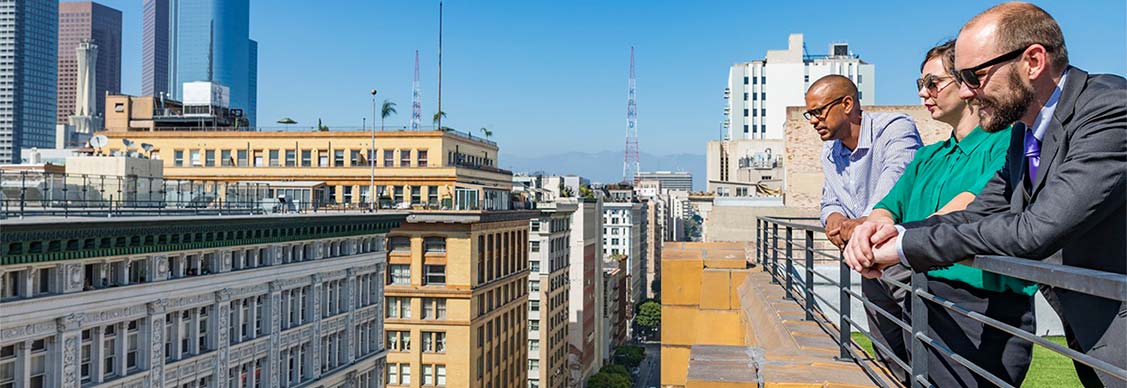How governments and businesses are partnering to decarbonize cities
Public-private initiatives, education and incentives are vital to reach net zero goals
With the coming decade a pivotal time for reducing carbon emissions, city leaders are increasingly joining forces with developers, investors and corporates to make the built environment more sustainable.
From San Francisco’s Zero Emission Building Taskforce to Melbourne’s 1200 Buildings Program, which retrofitted over 540 office buildings in the city centre, more cities are spearheading collaborative initiatives in the race to net zero.
With real estate accounting for 40 percent of carbon emissions, the industry has a key role to play.
Recent research from JLL found that 85 percent of policymakers, investors and occupiers agree strong partnerships between cities and real estate are instrumental in meeting sustainability targets.
While many initiatives offer financial incentives such as tax credits, grants, fee waivers and loan reductions for retrofitting older buildings and ensuring more sustainable new construction, authorities are increasingly exploring other options. These include faster construction permits for buildings that meet green ratings in cities like Seattle and promoting voluntary sustainability certification schemes such as NABERS and BREEAM.
“Cities are looking at more creative ways to incentivise developers, owners and occupiers,” says Jeremy Kelly, Lead Director of Global Cities Research at JLL. “This is where working in partnership with the real estate industry is so important if cities are to reach net zero goals; city leaders have to recognise this.”
A network of valuable insights
Knowledge sharing is a core part of successful partnerships. Take Copenhagen’s Energy Leap project, which brings together large building owners who agree to reduce energy consumption by three percent a year. The successful measures help point the way for smaller owners and occupiers to meet carbon reduction goals – and support Copenhagen’s bid to be the world’s first carbon-neutral city by 2025.
“Incentives, taxation and regulation need to be balanced with advocacy and education. Where successful cities will win out is in voluntary partnerships that help with the sharing of wisdom,” says Kelly.
In Latin America, a WorldGBC project has introduced building efficiency policies and systems to support local construction industries and drive sustainable development. Accelerator programmes in New York City, London and Dubai are helping owners and investors retrofit buildings to lower carbon emissions.
“There’s a growing recognition among leading real estate corporations and city governments that they have a role to play in supporting smaller companies and individual owners that lack the resources and knowledge to take action,” says Kelly.
For smaller developers, partnerships involving many members can also create the economies of scale that lower the financial hurdle of investing in sustainability upgrades.
Increasing regulation
Tighter regulations at city and national level are also driving sustainable building practices.
A landmark law in New York City that takes effect in 2024 will penalise buildings that exceed certain emissions levels, with fines potentially running to nearly $1 million a year for mid-sized apartment blocks. In the Netherlands, it will be illegal from 2023 to lease energy-inefficient buildings.
Some countries have already implemented similar measures. In Singapore, non-compliance with building efficiency measures has long attracted penalties including fines and permits being withdrawn.
“As net zero goals become a core part of development strategies, we’ll see more mandatory regulations that demand a certain level of energy efficiency,” says Kelly.
“But to effectively hold companies accountable partly depends on the ability to measure these metrics. There’s a need for data and technology that enables transparent reporting.”
Looking for more insights? Never miss an update.
The latest news, insights and opportunities from global commercial real estate markets straight to your inbox.
Challenges to collaboration
While some cities such as New York, Los Angeles, Paris, Sydney and Melbourne are noticeably taking action, others are lagging. In fact, 69% of senior leaders surveyed by JLL believe that a lack of incentives from city governments is a significant barrier to achieving sustainability ambitions.
One hurdle for effective partnerships is a lack of established best practices. “There is a historical adversary between the two sectors, which will require a culture shift,” says Kelly.
“Governments need to see the real estate industry as partners in shaping more sustainable cities, while the private sector needs to become more collaborative with its knowledge.”
The need for transparency in government processes also means that partnerships need to set ground rules on how they work with industry providers. “Creating this transparent framework is critical, and different cities are experimenting with different approaches,” says Kelly.
Initiatives at a neighbourhood level can be a vital step forward. “Partnerships between councils and local developers can accomplish what might be more difficult for the private sector engaging with city-wide authorities,” Kelly says.
Whatever the route, cities know the coming years will be critical in powering the huge changes needed to lay the groundwork for a low-carbon future. And that requires teamwork.
“There’s a real sense of urgency and a recognition that the challenge of moving to a decarbonised built environment is beyond the reach of a single stakeholder in a city,” concludes Kelly.
